“HI,” he says when he steps through the door, full of secret self-satisfaction. “I made a reservation for seven o’clock, but I’m afraid I got delayed.” He doesn’t sound like himself, and he likes it that way.
I’m changing, he tells himself. You see it? he asks BW. You know what it is? I’m on the verge of becoming a happy man. Confident. Confident and happy. Apparently all it takes is the love of a woman. Isn’t that amazing?
“The name is Barber,” he says. “I think someone’s probably waiting for me.”
This statement is acknowledged with an expression that has the approximate shape of a smile. “Barber,” says the smiling host. “Seven o’clock. We still have your table for you.”
A little ice in the voice there, he thinks. Well, fuck you. He smiles but offers no thanks for their holding the table.
“You’re the first to arrive,” says the smiling host, with, perhaps, just a little more ice. “This way please.”
The first to arrive? thinks Matthew. Where’s Liz? He follows the host to a table in the back. In the past, whenever he was shown to a table in the back, he felt that he’d been judged and found wanting, because he knows that the better-looking, better-dressed customers are seated in the front, in the window, as advertising, but he’s glad to be seated in the back this evening. He wants privacy.
It’s a long, narrow room, with green velvet banquettes along both sides and a partition, at chest height, running lengthwise, dividing the room into halves with the dimensions of a bus. Matthew has found this linearity straitening and annoying, the exaggerated perspective making him feel uneasy from the moment he sat down. Tonight, however, sitting in the rear corner, he feels that he’s at the focus of the room, where all sightlines converge, and he likes it.
This really is the preferred seat, he tells himself. Funny that I never realized it before. You have a good view — the best possible view — of people as they enter. And entering Two-Two-Two has always been a performance.
The room is just as Matthew remembers it. He’s pleased, since it suits his mood to have things as they were, but he can’t help wondering about the wisdom of the new owners’ decision not to redecorate.
They haven’t even touched up the paint.
The furniture and moldings are black lacquer, nicked and knocked and scarred by blows from chairs, trays, and customers out of control. Several years ago, Two-Two-Two was the liveliest spot in town. The bar was so crowded, even on weeknights, that the drinkers spilled into the dining room and turned the place into a party. Everyone seemed to like it that way — even Matthew, once he got used to it. He and Liz used to drive in from Lincoln for dinner fairly frequently for a while; it was an adventure, and anecdotes about Two-Two-Two were important in suburban conversations at the time. The Barbers invariably found that their table wasn’t ready when they arrived, but they soon came to expect that (indeed, it was the commonest anecdote about Two-Two-Two), and they would get a drink at the bar and watch the party. They never joined it, but it amused them to watch. When they began recognizing people, they were able to follow the intricacies of the table-hopping dance that went on there. In all their many visits, Matthew and Liz never noticed, or never allowed themselves to notice, that nearly everyone in the place was drugged to one degree or another, on one substance or another. Two-Two-Two was the first mainstream place in Boston where cocaine was sold and consumed openly in the rest rooms, and the drug trade was a part of the place’s cachet, but Matthew and Liz weren’t part of it, and didn’t want to be part of it, so they let themselves fail to notice it. It took a long time before anyone realized that the party was killing the place. The regulars were making it too much their own. Night after night, the people there were the same people who were always there. They had begun to bore themselves. When total collapse finally came, the space remained vacant for months. After Liz left Matthew and he moved into the city, he would see, more often than he could have believed possible, a former regular standing at the door, peering in, blocking the reflections with his hand, apparently mystified that the place should be closed, hoping that there might be someone inside who would open up for him. Only much later did Matthew learn how many people had been going there not for the food or conversation, but to make their connections.
And where’s my connection? he asks himself. Where’s Liz?
[to be continued]
Have you missed an episode or two or several?
You can begin reading at the beginning or you can catch up by visiting the archive or consulting the index to the Topical Guide.
You can listen to the episodes on the Personal History podcast. Begin at the beginning or scroll through the episodes to find what you’ve missed.
You can listen to “My Mother Takes a Tumble” and “Do Clams Bite?” complete and uninterrupted as audiobooks through YouTube.
You can ensure that you never miss a future issue by getting a free subscription. (You can help support the work by choosing a paid subscription instead.)
At Apple Books you can download free eBooks of Little Follies and Herb ’n’ Lorna.
You’ll find overviews of the entire work in An Introduction to The Personal History, Adventures, Experiences & Observations of Peter Leroy (a pdf document) and at Encyclopedia.com.






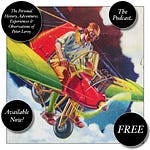



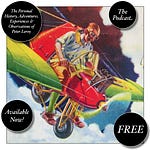
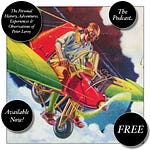
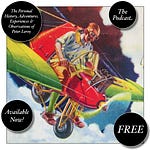
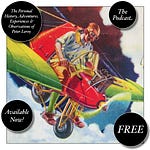
Share this post